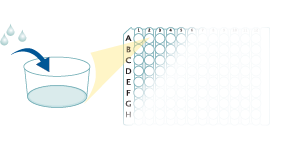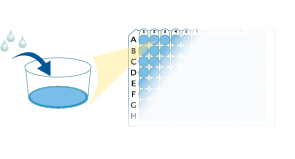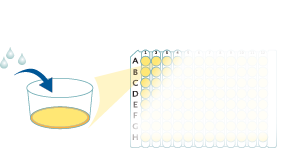Mouse IL-3 Quantikine ELISA Kit Summary
Product Summary
Precision
Cell Culture Supernates, Serum
| Intra-Assay Precision | Inter-Assay Precision | |||||
|---|---|---|---|---|---|---|
| Sample | 1 | 2 | 3 | 1 | 2 | 3 |
| n | 20 | 20 | 20 | 20 | 20 | 20 |
| Mean (pg/mL) | 33 | 119 | 396 | 32 | 120 | 400 |
| Standard Deviation | 1.7 | 8.3 | 22 | 2.5 | 5.5 | 18 |
| CV% | 5.2 | 7 | 5.6 | 7.8 | 4.6 | 4.5 |
Recovery
The recovery of mouse IL-3 spiked to three levels throughout the range of the assay in various matrices was evaluated.
| Sample Type | Average % Recovery | Range % |
|---|---|---|
| Cell Culture Supernates (n=5) | 104 | 91-114 |
| Serum (n=5) | 96 | 90-106 |
Linearity
Scientific Data
Preparation and Storage
Background: IL-3
M-CSF, also known as CSF-1, is a four-alpha-helical-bundle cytokine that is the primary regulator of macrophage survival, proliferation and differentiation. M-CSF is also essential for the survival and proliferation of osteoclast progenitors. M-CSF also primes and enhances macrophage killing of tumor cells and microorganisms, regulates the release of cytokines and other inflammatory modulators from macrophages, and stimulates pinocytosis. M-CSF increases during pregnancy to support implantation and growth of the decidua and placenta. Sources of M-CSF include fibroblasts, activated macrophages, endometrial secretory epithelium, bone marrow stromal cells and activated endothelial cells. The M-CSF receptor (c-fms) transduces its pleotropic effects and mediates its endocytosis. M-CSF mRNAs of various sizes occur. Full length human M-CSF transcripts encode a 522 amino acid (aa) type I transmembrane (TM) protein with a 464 aa extracellular region, a 21 aa TM domain, and a 37 aa cytoplasmic tail that forms a 140 kDa covalent dimer. Differential processing produces two proteolytically cleaved, secreted dimers. One is an N- and O- glycosylated 86 kDa dimer, while the other is modified by both glycosylation and chondroitin-sulfate proteoglycan (PG) to generate a 200 kDa subunit. Although PG-modified M-CSF can circulate, it may be immobilized by attachment to type V collagen. Shorter transcripts encode M-CSF that lack cleavage and PG sites and produce an N-glycosylated 68 kDa TM dimer and a slowly produced 44 kDa secreted dimer. Although forms may vary in activity and half-life, all contain the N-terminal 150 aa portion that is necessary and sufficient for interaction with the M-CSF receptor. The first 223 aa of mature human M-CSF shares 88%, 86%, 81% and 74% aa identity with corresponding regions of dog, cow, mouse and rat M-CSF, respectively. Human M-CSF is active in the mouse, but mouse M-CSF is reported to be species-specific.
Assay Procedure
Refer to the product- Prepare all reagents, standard dilutions, and samples as directed in the product insert.
- Remove excess microplate strips from the plate frame, return them to the foil pouch containing the desiccant pack, and reseal.
- Add 50 µL of Assay Diluent to each well.
- Add 50 µL of Standard, Control, or sample to each well. Cover with a plate sealer, and incubate at room temperature for 2 hours.
- Aspirate each well and wash, repeating the process 4 times for a total of 5 washes.
- Add 100 µL of Conjugate to each well. Cover with a new plate sealer, and incubate at room temperature for 2 hours.
- Aspirate and wash 5 times.
- Add 100 µL Substrate Solution to each well. Incubate at room temperature for 30 minutes. PROTECT FROM LIGHT.
- Add 100 µL of Stop Solution to each well. Read at 450 nm within 30 minutes. Set wavelength correction to 540 nm or 570 nm.





Citations for Mouse IL-3 Quantikine ELISA Kit
R&D Systems personnel manually curate a database that contains references using R&D Systems products. The data collected includes not only links to publications in PubMed, but also provides information about sample types, species, and experimental conditions.
13
Citations: Showing 1 - 10
Filter your results:
Filter by:
-
Impact of eosinophil-peroxidase (EPX) deficiency on eosinophil structure and function in mouse airways
Authors: CM Percopo, JO Krumholz, ER Fischer, LS Kraemer, M Ma, K Laky, HF Rosenberg
J. Leukoc. Biol., 2018-10-04;0(0):.
Species: Mouse
Sample Types: Cell Culture Supernates
-
Calf Spleen Extractive Injection protects mice against cyclophosphamide-induced hematopoietic injury through G-CSF-mediated JAK2/STAT3 signaling
Authors: W Lu, D Jia, S An, M Mu, X Qiao, Y Liu, X Li, D Wang
Sci Rep, 2017-08-21;7(1):8402.
Species: Mouse
Sample Types: Plasma
-
Comprehensive Ex Vivo Transposon Mutagenesis Identifies Genes That Promote Growth Factor Independence and Leukemogenesis.
Authors: Guo Y, Updegraff B, Park S, Durakoglugil D, Cruz V, Maddux S, Hwang T, O'Donnell K
Cancer Res, 2015-12-16;76(4):773-86.
Species: Mouse
Sample Types: Cell Culture Supernates
-
Protein malnutrition induces bone marrow mesenchymal stem cells commitment to adipogenic differentiation leading to hematopoietic failure.
Authors: Cunha M, Lima F, Vinolo M, Hastreiter A, Curi R, Borelli P, Fock R
PLoS ONE, 2013-03-14;8(3):e58872.
Species: Mouse
Sample Types: Cell Culture Supernates
-
Bcl3 prevents acute inflammatory lung injury in mice by restraining emergency granulopoiesis.
Authors: Kreisel D, Sugimoto S, Tietjens J, Zhu J, Yamamoto S, Krupnick AS, Carmody RJ, Gelman AE
J. Clin. Invest., 2010-12-13;121(1):265-76.
Species: Mouse
Sample Types: Serum
-
Suppression of established experimental autoimmune uveitis by anti-LFA-1alpha Ab.
Authors: Ke Y, Sun D, Zhang P, Jiang G, Kaplan HJ, Shao H
Invest. Ophthalmol. Vis. Sci., 2007-06-01;48(6):2667-75.
Species: Mouse
Sample Types: Cell Culture Supernates
-
IL-7 induces myelopoiesis and erythropoiesis.
Authors: Aiello FB, Keller JR, Klarmann KD, Dranoff G, Mazzucchelli R, Durum SK
J. Immunol., 2007-02-01;178(3):1553-63.
Species: Mouse
Sample Types: Cell Culture Supernates
-
Regulatory T cells prevent catastrophic autoimmunity throughout the lifespan of mice.
Authors: Kim JM, Rasmussen JP, Rudensky AY
Nat. Immunol., 2006-11-30;8(2):191-7.
Species: Mouse
Sample Types: Cell Culture Supernates
-
A novel polysaccharide of black soybean promotes myelopoiesis and reconstitutes bone marrow after 5-flurouracil- and irradiation-induced myelosuppression.
Authors: Liao HF, Chen YJ, Yang YC
Life Sci., 2005-02-25;77(4):400-13.
Species: Mouse
Sample Types: Cell Culture Supernates
-
Increased interleukin-10 associated with low IL-6 concentration correlated with greater survival rates in mice infected by rabies virus vaccinated against it and immunomodulated with P. acnes.
Authors: Megid J, Kaneno R, Nozaki CN, Brito CJ, Almeida MF
Comp. Immunol. Microbiol. Infect. Dis., 2004-11-01;27(6):393-411.
Species: Mouse
Sample Types: Serum
-
The protein tyrosine kinase inhibitor AG126 prevents the massive microglial cytokine induction by pneumococcal cell walls.
Authors: Hanisch UK, Prinz M, Angstwurm K, Hausler KG, Kann O, Kettenmann H, Weber JR
Eur. J. Immunol., 2001-07-01;31(7):2104-15.
Species: Mouse
Sample Types: Cell Culture Supernates
-
Interleukin 3 and granulocyte-macrophage colony-stimulating factor are not required for induction of chronic myeloid leukemia-like myeloproliferative disease in mice by BCR/ABL.
Authors: Li S, Gillessen S, Tomasson MH, Dranoff G, Gilliland DG, Van Etten RA
Blood, 2001-03-01;97(5):1442-50.
Species: Mouse
Sample Types: Serum
-
A secreted and LIF-mediated stromal cell-derived activity that promotes ex vivo expansion of human hematopoietic stem cells.
Authors: Shih CC, Hu MC, Hu J
Blood, 2000-03-15;95(6):1957-66.
Species: Mouse
Sample Types: Cell Culture Supernates
FAQs
No product specific FAQs exist for this product, however you may
View all ELISA FAQsReviews for Mouse IL-3 Quantikine ELISA Kit
There are currently no reviews for this product. Be the first to review Mouse IL-3 Quantikine ELISA Kit and earn rewards!
Have you used Mouse IL-3 Quantikine ELISA Kit?
Submit a review and receive an Amazon gift card.
$25/€18/£15/$25CAN/¥75 Yuan/¥2500 Yen for a review with an image
$10/€7/£6/$10 CAD/¥70 Yuan/¥1110 Yen for a review without an image







